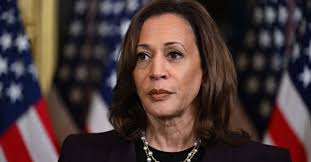By: Luke Allen
In a truly shocking revelation, the campaign team for Vice President Kamala Harris has been accused of disseminating disinformation through altered media and misleading endorsements. The controversy came to light after a report by Axios, a news outlet known for its Democratic leanings, exposed the campaign’s questionable tactics.
One of the central allegations involves manipulating photographs to exaggerate the size of crowds at Harris’s airport arrivals. These images were reportedly altered to project a more robust public reception than reality. Real-life photos of the event showed no crowds, while ads posted on Google show a large crowd on the runway at the gate. Such alterations raise significant ethical concerns about the integrity of campaign communications, prompting a deeper reflection on the standards of political discourse.
Tulare County Sheriff Mike Boudreaux has publicly refuted claims that he endorsed Harris’s border policy. According to Boudreaux, an old video featuring him was repurposed in a campaign ad, misleadingly implying his support for her policies. Boudreaux has categorically denied any official endorsement, highlighting the campaign’s severe breach of trust and accuracy.
The campaign’s actions have also extended to manipulating news articles. Reports suggest that Harris’s team took articles from reputable sources such as CNN, USA Today, NPR, CBS, The Guardian, and Reuters, altering headlines and descriptions to suggest these outlets supported her policy positions falsely. These media organizations were reportedly unaware of the misrepresentation, raising concerns about the unauthorized use of their content.
The implications of these actions are significant. The spread of disinformation not only undermines Harris’s campaign’s credibility but also threatens the democratic process by misleading voters. It creates a false narrative that major news outlets are aligned with her policies, potentially swaying low-information voters who won’t verify the authenticity of these claims.
The controversy is further compounded by Harris’s absence from press events since winning her party’s nomination. This avoidance has fueled speculation and criticism, particularly from those who view transparency and accountability as cornerstones of effective leadership.
The Harris campaign, which has often criticized the spread of disinformation, now finds itself at the center of a scandal that contradicts its stated values. This situation underscores the challenges of navigating truth and transparency in political campaigns and the broader impact of misleading information on public trust.
As the story unfolds, it remains to be seen how the Harris campaign will address these allegations and what steps will be taken to restore credibility among voters and media partners. The urgency for honest and transparent communication has never been more critical, especially in an era where disinformation can rapidly shape public perception.




